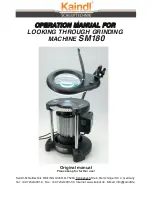
ENGLISH • 23
Caution! Wheels used for edge grinding may break
if they bend or twist while being used for cut-off work or
deep grinding. To reduce the risk of serious injury, limit the
use of these wheels to shallow cutting and notching (less
than 1/2” in depth). The open side of the guard must be
positioned away from the operator.
Removing (Fig. F)
f
Keep the spindle lock (4) depressed and loosen the
outer flange (14) using the two-pin spanner (15)
(Fig. F).
f
Remove the outer flange (14) and the disc (12).
Fitting wire cup brushes and stringer bead/cable
twist brushes
Wire brushes screw directly on the spindle of the machine
without the use of flanges. When using wire brushes,
thread firmly on spindle by hand.
Fitting abrasive discs
Use an abrasive disc with a backing pad for sanding with
your angle grinder.
f
Remove the guard.
f
Place the flange, (backing pad and abrasive disc sold
separately) and outer flange on the spindle as shown
in
Fig. G, shows how to attach an abrasive disc
with a rubber backing pad.
f
Tighten the abrasive disc as shown in Fig. H,
by depressing the spindle lock button and turning the
abrasive disc by hand.
OPERATION
Warning! To minimize the risk of serious personal
injury, disconnect the tool from the power supply before
adjusting or removing/installing accessories. Before
reassembling the tool, press and release the switch to
ensure that the tool is off.
Warning!
f
Make sure all materials to grind are fastened in
the correct position.
f
Use fasteners or a vise to hold and secure
the work piece to a stable work platform. It is important
to firmly secure and support the work piece to prevent
it from moving or to prevent you from losing control
over it. The movement or the loss of control over
the work piece can lead to accidents and cause
personal injury.
f
Secure the work piece. Holding the work piece
with your hand does not guarantee that it is secure,
it is better to secure it with fasteners or a vise.
f
Provide support to the panels or larger work pieces,
in order to reduce the risk of jamming and kickback.
The larger work pieces sometimes have bends due
to their own weight. You must place supports under
the work piece, near the cutting line and the edge
itself, on both sides of the blade.
f
Apply slight pressure on the tool. Do not apply lateral
pressure on the abrasive blade.
f
Avoid overloading. If the tool gets hot, let it work for
a few minutes without load.
1. Hold the tool firmly with both hands (one hand in
the compartment and the other on the side handle).
Turn on the tool and bring the grinding blade close to
the work piece.
2. Keep the edge of the blade inclined at an angle of 15
to 30 degrees, against the surface of the work piece.
3.
When using a new grinding blade, do not operate
it in the B direction, otherwise, you will be cutting
the work piece. When the edge of the blade is rounded,
you can operate the grinder in the A or B direction.
Switching on and off
f
To switch the tool on, press the on/off switch (1).
f
For continuous operation, press the lock-on button
and release the on/off switch.
f
To switch the tool off, release the on/off switch. To
switch the tool off in continuous operation, press the
on/off switch once more and release it.
Warning! Do not switch the tool off while under load.
Overload
Overloading will cause damage to the motor of your angle
grinder. This can happen if your angle grinder is subjected
to heavy use for prolonged periods of time. Do not in any
circumstances, attempt to exert too much pressure on your
angle grinder to speed up your work. The abrasive discs
operate more efficiently when light pressure is exerted,
thus avoiding a drop in the speed of your angle grinder.
SANDING
Precautions to take when sanding paint
f
Sanding of lead based paint is
NOT RECOMMENDED
due to the difficulty of controlling the contaminated
dust. The greatest danger of lead poisoning is to
children and pregnant women.
f
Since it is difficult to identify whether or not a paint
contains lead without a chemical analysis, we
recommend the following precautions when sanding
any paint:
f
Personal safety
f
No children or pregnant women should enter the work
area where the paint sanding is being done until all
cleanup is completed.
f
A dust mask or respirator should be worn by all
persons entering the work area. The filter should be




































